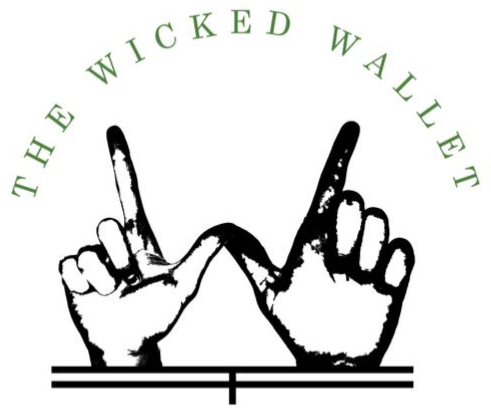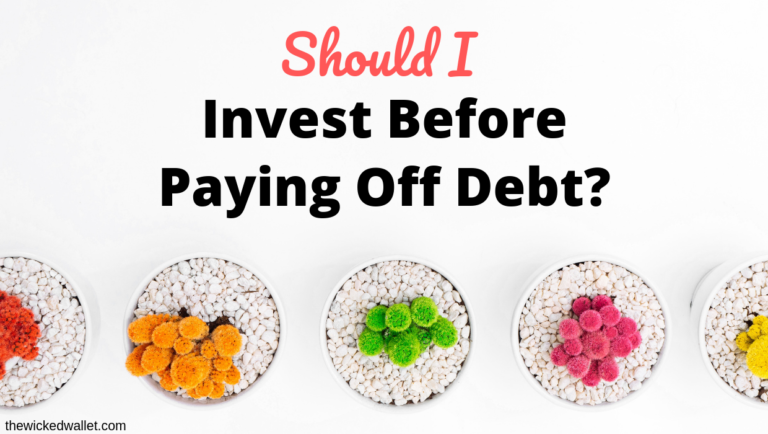A question as old as time… not really but at least as old as the creation of debt tools and investment vehicles. It is likely that the debate will always go on. Half of people thinking that all debt must be eliminated prior to investing and the other half thinking that you should be paying only the minimum on all debt payments so you can put as much money towards investments as possible. My one problem with each side is that all debt and all investments are not created equal.
What do I mean by “not created equal”? Well, considering all of the factors that go into evaluating debt or an investment, there is no one-size-fits-all answer. Everyone has an answer that is unique to their own financial and emotional situation. This brings their risk tolerance into play.
Keep reading to learn how you can earn $100 by refinancing your loans through SoFi!
Risk Tolerance
Risk tolerance is normally used when talking about investments. It measures an investors comfort level with investing portions of their money and potentially losing large sums of money. The higher the risk tolerance, the more comfortable an investor is with losing money, this doesn’t mean they want to lose money however they understand that to to have potentially higher returns you need to take greater risks.
When debating if you should pay off debt or invest, you need to evaluate your risk tolerance for each. Does the idea of paying debt for 30 years eat you alive? Do you have a meltdown every time you see an investment drop in price? These are just some of the many questions you need to ask yourself.
If you find that you are not comfortable with having any open loans, then your answer is clear. Pay off your debt. But if you don’t mind paying the minimum balance and putting the rest of your disposable income towards investments then go for it!
Again, every single person is different. However, even once you have your risk tolerance out in the open, I would highly suggest evaluating each options by weighing out the factors below to make your money work for you in the most optimized way.
Emergency Fund
First things first, before you begin either, you should be making sure you have an adequate emergency fund to survive in case the worst happens. Lucky for you, this article outlines exactly what you need to know about emergency funds.
I cannot stress this enough. It would really stink to be putting all of your money towards a loan payment then to lose your job and not have money saved to pay for food, your bills or even your next monthly minimum loan payment.
Once you have an emergency fund set aside, there are a couple other factors you need to consider.
Factors to Consider
#1. Always Pay the Minimum Balance
If you have already taken out debt and it’s time to pay it back, you need to make sure you are always at least paying the minimum payment due. If you are not, this can seriously hurt your credit score.
#2. Employer Match
Does your employer offer retirement plans? If so, ask them if they offer an employer match. Hopefully they do. This is something you always want to partake in. This is like a bonus. Ensure that you are making at least the minimum contributions needed to fully utilize the match.
#3. Consumer Debt
Any credit card debt should be on the top of your pay down list. This debt spirals out of control rapidly. These often have ridiculously high interest rates that dig you deeper and deeper into debt. Remember that a credit card company makes it’s money on you not paying your monthly balance and owing interest. Don’t let them make money off of you!
Always pay off your credit card balance in full every month. Do not let balances carry over and never just pay the minimum amount due.
#4. Interest Rates
Do you have high interest debt? I would consider anything above 7% as high interest however most textbooks say anything above 10% is high. But you can even refinance debt that you may think has a low interest rate to try to get an even lower option.
Seriously consider refinancing your loans. You can refinance as many times as you need through as many difference services as you would like to get the lowest interest rate you can possibly get.
I am personally partial to SoFi because of their friendly team and easy-to-use dashboard but there are so many other refinancing options. If you use this SoFi link then you automatically get $100 just for refinancing with SoFi (it is seriously one of the better deals I have heard of). And since you are super smart you will totally put that money towards your debt reduction plan or your next monthly loan payment!
#5. Tax Benefits
If you have gotten to this point, you should have no consumer debt, no high interest bearing debt and you should be maxing out any employer match if given. Now what? Well, let’s take a gander into the tax benefits of investing vs. debt pay down.
By investing in tax-advantaged retirement accounts, you will be able to reap some tax advantages depending on the account. For example, a traditional IRA would allow you to lower your taxable income for that year. However, a Roth IRA contribution is taxed the day it is made and therefore not taxed upon withdrawal so if you are in a lower income bracket and can afford to invest into a Roth IRA it may be a wise decision for you.
That all said, each year you are allowed to deduct up to $2,500 in student loan interest on your tax return. This doesn’t have to be itemized but if you are a high income earner you may not be eligible. So with this, you may want to ensure your minimum payments are taking full advantage of this deduction.
Also, if you have a mortgage you can deduct the mortgage interest on a mortgage worth up to $750,000 from your taxable income on your tax return. Before December 2017, you could previously deduct up to $1 million of mortgage debt in addition to $100,000 from a home equity loan. The home equity loan deduction is no longer allowed. This mortgage deduction is another great one that you want to take full advantage of if possible.
#6. Prepayment Penalties
Before you get all excited and ready to completely pay off your debt, double check with your service provider to ensure that there are no penalties for paying down your debt early.
It’s shocking because who wouldn’t want to get their money back early? But some providers tack on hefty fees that can put a huge dent in your wallet if you pay your debt off before the term agreed upon when you originally applied for the loan.
Other Thoughts
If you are finding that after paying all of your bills and basic living expenses you don’t have any extra income to throw into investments or towards paying down chunks of debt, I would suggest maybe thinking about starting to side hustle. This article outlines 17 of the best side hustles to start with that can honestly be really lucrative. We hear more and more these days that people eventually left their full time job due to their side hustle income being more than enough to supplement their income.
Another great way to make extra money to throw at your debt or into investing is Ebates. Check out this article that walks you through how to make money through Ebates and gives you a free $10!
When talking to others about this subject, don’t forget your specific risk tolerance is different than others. You will hear people say that “if you pay off a loan early, you are guaranteed to save money on interest but if you invest in the market, your returns are not guaranteed”. While logically this is true, this may not be the best option for you. You are not being selfish by thinking about yourself first in this situation! Remember your risk tolerance and stay true to it.
You will also likely hear something along the lines of “a dollar today costs less tomorrow”. This means that debt technically gets cheaper over time. A $100,000 loan taken out today will be cheaper in 10 years due to inflation. This is logically true. That being said, debt is still debt and should at least be paid to the best of your abilities (minimum monthly payments).
Before you start investing, maybe check out this article for the difference between ETFs and Index Funds and Why You Need To Know!
Conclusion
What worked for someone else may not work for you and vice versa. Be aware of your risk tolerance prior to making any rash decisions. Analyze your debt and your potential investments using the factors listed above. If something isn’t clear or if you would like to learn more, please reach out in the comments!



